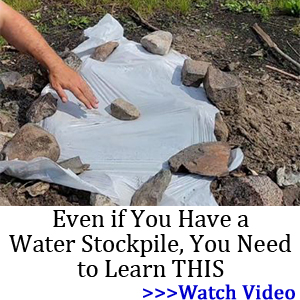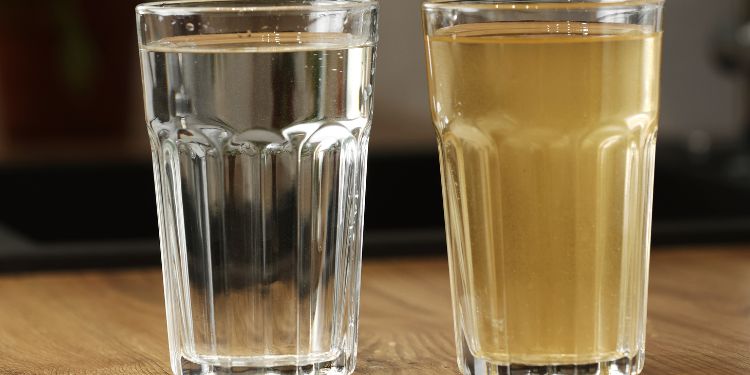Without water, it doesn’t matter much what other preparations you’ve made – you’re only going to survive for a matter of days. In a crisis the mains water supply most of us rely on is likely to be cut off, and even if it isn’t there’s no guarantee the water will remain safe to drink.
Depending on what sort of emergency we’re facing, all other water sources could be contaminated, too – rivers, reservoirs, even deep wells. If you want to survive whatever the future throws at you it’s vital to have enough clean, safe water stockpiled to last you at least a few months.
This isn’t even an expensive prep, because while water is vital it’s also cheap (until the SHTF, anyway), so most preppers have a good supply of it laid up.
Stored water doesn’t last forever, though. Almost any water, unless it’s actually sterile and comes in a sealed container, is going to contain some microorganisms. Storing water for months gives these a chance to grow, and eventually they’re going to reach levels that make the water unpleasant – or even dangerous – to drink.
There are ways to slow the growth of these organisms, such as keeping water containers in a cool dark place, using opaque blue containers or even dropping a silver coin in each barrel of water, but keep it long enough and eventually things will grow in it.

That’s why, however you store your water, you should regularly empty your containers, wash them and refill them with fresh water. I keep most of my water in food-grade blue plastic barrels in my shed, and every two or three months I haul them all out, empty them, wipe down the insides with a cloth damped with a very weak bleach solution, then refill them.
I know the water in those barrels will be safe to drink whenever I need it, because their contents have never been stored for a really long time. However, I also keep a smaller stockpile in the house.
If that sounds like a lot of work, you could always try this backpack-sized water generator. I couldn’t imagine outlasting a crisis without it. It pulls clean water directly from the air, producing up to 40 gallons a day, all without being connected to the grid. My family and I have been using it for over a year, and it’s been a game-changer.
A couple of years ago I started buying orange squash in gallon jugs, and I decided that instead of throwing the jugs out when they were empty I’d wash them out, fill them with water and store them away wherever I had space, just to give me a few days’ extra reserves if I needed it.
“A few days” slowly expanded to a couple of weeks’ worth, which is definitely useful. However, while I try to empty and refill the jugs regularly, sometimes some of them get overlooked.
I was checking my stockpiles last week and found a few that had been overlooked for a long time – two years, in one case. I’m not completely sure why, but instead of just washing out and refilling the containers, I decided to drink some of it to see how it had handled being stored.
Stored for One Year
I started with a jug that’s been in the storage space under my stairs for just over a year. The temperature is pretty stable in there and it isn’t in direct sunlight, but it isn’t very dark either. Once I’d brushed some dust off the jug its contents looked fine – perfectly clear, with no signs of anything growing. That was a promising start, so I poured myself a glass and tried it.
I have to say it wasn’t the most pleasant water I’ve ever drunk, but it wasn’t actually terrible either.

It was very flat and deoxygenated, with a slight aftertaste. In an emergency I wouldn’t hesitate to drink water that tasted like that.
However, taste isn’t everything, and I wanted to see if it was going to have any more serious issues.
So I drank a 12oz glass of it.
Related: 8 Myths About Storing Water That Are Actually True
I figured that if the water was going to make me ill, 12oz should be enough to find out without actually killing me (even my curiosity has limits), so after drinking it I waited a few hours to see if anything was going to happen. Nothing did. If I was short of water, I’d be happy to drink the contents of this jug. Apart from the taste, of course – but it turned out that if I made tea with it, it was fine.
Stored for Two Years
After that I decided to try another jug, this one from my kitchen. I have an odd and generally useless space down the side of my kitchen cupboard, and when it turned out to be just wide enough for a gallon jug to slip in, I stored a dozen of them in there.
Most of those jugs got rotated out, washed and refilled fairly regularly, but a couple right at the back got overlooked – and when I finally dug them out and checked the refill dates written on them, they were more than two years old.
I could tell right away this water wasn’t in as good condition as the first jug I’d tried. It had a cloudy look. It wasn’t actually murky – I wasn’t expecting the creature from the Black Lagoon to come shambling out of it – but it definitely wasn’t crystal clear.
It also had a very obvious stale smell when I opened and sniffed it. Still, beggars can’t be choosers, and if this was the last gallon of water I had in a crisis, I couldn’t afford to pour it away just because it smelled a bit funny. Determined to test it, I poured another 12oz glass.
 However, one sip was enough to persuade me not to drink it. This water tasted seriously unpleasant, and it wasn’t just flat and stale; there was a sort of biological, vaguely swampy taste to it. I got the feeling that if I drank it, it would make me ill.
However, one sip was enough to persuade me not to drink it. This water tasted seriously unpleasant, and it wasn’t just flat and stale; there was a sort of biological, vaguely swampy taste to it. I got the feeling that if I drank it, it would make me ill.
So, straight from the jug, I’d say this water wasn’t safe to drink.
It was still a gallon of water, though, and in a survival situation that could mean several more days of life. Would I really reject it? Of course it could still be used for washing and so on, but I wanted it drinkable.
So I poured a pint of it into my filter jug and let it run through. That got rid of the cloudiness and most of the taste. Next, I boiled it – just in the kettle, not the ten minutes at a rolling boil you’d give it for sterilization – and made tea. The tea tasted fine, and after drinking it I was fine, too.
Finally I did put another pint of it through a ten-minute boil. Once it had cooled, apart from the usual flat, oxygen-free taste of boiled water, it was definitely drinkable. So I drank a whole glass of it and, next day, it was clear I’d got away with it.
What Did I Learn?
Well, I learned that it’s important to store water properly – ideally not in clear plastic jugs that do get some indirect sunlight – and to rotate it regularly.
Leaving it in a container for three, or even six, months shouldn’t have any real impact on its safety or taste, as long as it isn’t exposed to too much heat. A year, though, and you’ll start to notice its age when you taste it.
Even if you’ve stored water for much longer than it should have been, it can still be salvaged. Just treat it like water from a river or pond, and it should be fine – filter it, then sterilize either by boiling or chemical treatment. It might not be the best tasting water ever, but it will still save your life.
You may also like:
 8 Ways to Protect Yourself From Bank Failures
8 Ways to Protect Yourself From Bank Failures
Read This Before Stockpiling Water in Blue Barrels (Video)
These 6 Types of People Wouldn’t Last a Day Off Grid
How to Keep a Slaughtered Animal From Spoiling by Eating it in the Right Order















Thank you Mr Mason, this article was useful because it reminded me that I need to refill my water containers. After that I am going to the store to buy more alum. I will use it to clarify river water if I have to use that as my source. Of course it will need clarified, filtered, and disinfected, but its doable. I want to have several options for water supplies.
Like to know how and who these authors of these posted articles get to post and what is their background experiences?
Are these real people from the real world environment or people repackaging articles from other so called experts?
Do we question what other prep sites tell us also in what is the real truth of prepping?
Some articles don’t jive with current knowledge, could these be Artificial Intelligence influence anymore?
We want to know.
Claude Davis is a fictitious name. Doesn’t matter though. Information posts can be checked in many cases.
Water can go bad if not sanitized beforehand.
It can go bad in bad containers.
Want pretty good water then it will cost you a small fortune to make it.
Well water (usually) or rain water.
Filtration.
Sanitization (chemical, heat or UV)
Reverse osmosis.
When in doubt heat the water a second time.
Not 100% perfect with chances are it should be OK.
All the above requires a LOT of power do you need a whole lot of solar panels and expensive batteries.
Not to mention storage containers.
If pumped into the house, you most certainly want COPPER water pipes soldered with silver solder.
NO PLASTIC!
I would say, that thats fairly good info… never really thought about sampling my stored water… very good advice to rotate it more often and yearly… as that same food for thought should apply to gasoline… Here, rurally, we have gasoline available at the pump without ethenol.. its a little pricey, but if your storing it, its worth it… I also keep fuel additives on had just in case… of course we all rotate our pantry can goods, right?..
Even if you have tons of water stored you still need to test it. That is even if stored perfectly there are temp changes, the storage container seal ability and contamination.
All is not lost, we can restore the water by refiltering and Aeration. Simply pour water from one container to another gets air back in so the stale taste is gone. You don’t need expensive equipment. Just a good filter system and good water containers with some chemical like bleach as a TEMPORARY preservative. This can help keep virus and bacteria slow grow as water is being stored under home purification standards.
For those living next to the beginning of the water source, spring, glacier, river you are lucky. Downstream of the water source is where the trouble begins and filtering is a must. We have industrial chemicals dumped into the water source downstream.
Off Topic;
Like the Roman Empire, opened up their borders, let the non citizens in and gave everyone citizenship. The Roman citizens and soldiers were suppose to be given land, there was not enough land for those illegals. Their military conscripted illegals into their military.
Currently the Western Countries are in the same flux as America is where they are following Rome. Destroying borders, believe in Christianity that was lost in Rome. The Islamist always like to breed and take over Christian churches to convert them into masque and demand their culture is more important to follow.
We are having Islamist protesting in major cities and most poorly educated Americans get on the bandwagon to change America. The modern downfall started with Obama and continues behind the scenes with his puppets.
America is being sold out, the government is flying Haitians into Ohio, some are by nature cannibalistic in culture.
Gov Tim Walz put sick Covid people into senior retirement centers that got seniors sick. Is this what we want to be in charge with Obama?
How will you vote in this next election?
It is off topic – relative to water concerns – but on topic with the upcoming election. Those with ears can hear and those with yes can see. Thanks.
TRUMP 2024!!! THE ONLY WAY!!!
I thought the roman empire took what ever they wanted….and is actually where Christianity started to help keep the people in line . I was not there 2000 years ago. Do your own research. I really don’t know……I’m sure history might have been skewed to favor the people in control at that time . Like what we are seeing now in our government. Ya …water is very important…… Have you ever wonderd what started the ice age ? And what started it melting ? I don’t think it was anything to do with the consumption of fossil fuels .
What about cisterns? Does the water go bad eventually?
You still have to test the water.
Water articles don’t mention the build up of biofilm in containers, even in open containers, we need to check always check to be sure. If you don’t know, then get a friend who knows or the local county agriculture agent. You get the city bureaucrats involved then you have red tape and fees.
“Quote by Ronald Reagan: The most terrifying words in the English …
Ronald Reagan — ‘The most terrifying words in the English language are: I’m from the government and I’m here to help.'”
My grandparents lived in rural SD without running water, propane heat, etc. They had a cistern for water supply. Whenever we visited we freely drank water from thee dipper in the bucket in the house and occasionally threw the bucket on the end of a rope into the cistern to draw more. We never had issues.
Now it seems to me that was not a good source of water because it came off the roof which had dust if not dirt on it and likely bird droppings as well.
I use a small distiller and distill the water into glass gallon jugs and cork the tops. I haven’t tested the water but it looks clear. I like the suggestion of aerating the water and/or putting a silver coin in it. Now, to try and find a silver coin.
A one ounce 90 to 99.9% silver coin per gallon of water I have heard to clean up water.
That’s a good way to hide your silver so anybody breaking in wouldn’t find it.
Ahhh! We have the good Lisa Blake today not the bad
Lisa Blake.Very nice.
Maybe the men in white coats took her to get help.
Kicking and screaming all the way I’m sure.
If they ever let Psychotic Lisa out she must stay on
her meds.
My former roommate stole my ID, personal information and uses it all over the place including these websites.
Question: is it advisable to filter water that has been stored (in a plastic container) with a Berkey type filter? Will it be safe to drink without boiling?
Good question. If the water was clean when stored, I would think a Berkey would be adequate.
PLLLLEEEEAAAASSSSSEEEE don’t make us listen to 15-30 minute videos on how to make our own water. GEEEEZzzzz Just 2-3 minutes then tell us what to buy!
You don’t need to listen that long. Try leaving the page after 2-3 minutes and a message will pop up giving you the option to read the transcript instead. Then you can scroll down quicklu to get the item for sale (or decide not to. In this case, the first video is a book to make an air dehumidifier run off a solar panel and into a new plastic garbage can. A small pump in the can goes to a valve/dispenser for filling up cups or jugs.) So, you have to pay for the book, pay for the parts, put it together to use it. Then you have to maintain it, clean it, etc.
Store filtered water in opaque containers out of sunlight in a cool, dark environment (below 78 degrees Fahrenheit to 35 degrees). I stored filtered water for years this way in a cool dark environment and the water was fine. Regular tap water I would filter before drinking or use it as grey water for cleaning and washing.
Get some Chlorine Dioxide water treatment from My Patriot Supply. Each one treats 60 gallons and it’s only $20.00
Water purity has been a problem for thousands of years. How our ancestors dealt with that subject should be remember. Boiling works, especially if the water is used to make beer. The beer most drank back then had less than 2% alcohol by volume, was flat and unflavored, malt and yeast was the sum of it. Where wine was used in the south, full strength wine was added to the best water available at about a 10 to one ratio leaving about a 1% to 2% alcohol content. The east generally used tea, several kinds, but all used boiling and most used a herb that usually contained tannin, (boric acid).
Hard frozen water does keep a loooooonngg time.
Needs to be potable before freezing first.
Dont waste your water, if you live in a dry country it is precious.Create a pond ,keep fish in it. Water your garden with it or build your self a simple home desalinator and recycle it in your desalinator.
Just curious if anyone has ever tried to save the water after defrosting a harvest right freeze dryer. I’ve always wondered if that would be considered drinkable water as it has been pulled out of food in frozen on the Freeze dryer chamber. We’ve run three batches of tomatoes through our this week and gotten about a gallon of water. Just tossed it. But in an emergency, would be good to know if it is potable.
Every once in a while something on this site causes me to actually put my brain in gear. Would the freeze dryer water be ok to drink? I am going to say yes, with some qualifying comments. First, if it’s an emergency I probably won’t be spending 18 hr and the power to run a freeze dry cycle so this is just a theoretical question. Then, if what you put in the chamber was food and you boil off the water then that water should be ok to drink. (you are boiling away the water just at a very low temperature) The next thing to think about is that the water is going to taste kind of like the food in the chamber. Flavors will be carried over just the same as when making moon shine. The condensate will be representative of the mash that you started with. So safe to drink, yes, but I can think of several other ways to come up with one gallon of drinkable water.
Thanks for making me think this one thru.
I’m sure most of us know that liquid bleach has a relatively limited shelf life as to using for water purification, I wonder once clothing or water safety are no longer viable. Are there any uses for it other than flushing? Is it good for anything like plant feeding? I certainly wouldn’t drink it, of course, but don’t know enough chemistry to know if it has other uses when it is “expired”.
–
Off topic, as above, If we were to EVEN CONSIDER conscripting illegal migrants into the service (some have proposed this as a way for them to “earn citizenship”) we would be issuing weapons and training these people to use them when in fact they have NO sense of American loyalty, no heritage, and could, in fact, be us arming people to try to take over this country from the inside. –
It’s not just certain groups attempting to change the fabric of the nation by over saturating some cities and infiltrating the gov’t., but that’s a factor as well. One politician (who “reputedly” married a family member to get them into the country) has SO many people from her original country living in her district that she recently was re-elected, in spite of spewing hatred for the Constitution and the American Flag. Again, a way for true American citizens to lose the country as we know it.
–
I’m old enough that I won’t be forced to endure this sorry state of affairs for too many decades, but I have 2 generations of descendants I don’t want to see living under a Socialist Regime.
–
If anyone knows the answer to my bleach query, I’d appreciate it. Sorry for the off topic commentary, but it’s important that IF WE ARE TO SURVIVE, we have a place worth surviving IN.
Regarding bleach.
A chemist once told me that bleach loses about 50% potency every month. (She was the lab supervisor for bacteriological testing for a city where I used to work.) That being said, the bleach will still maintain some potency for several months. Additionally, the human body is extremely sensitive to chlorine. (That’s why some people call it “chlorine bleach”.) The active ingredient in bleach is sodium hypochlorite (NaOCl). The human body can detect chlorine down 1 to 2 ppm (parts per million)(or mg/l (milligrams per liter)). For reference, public swimming pools are approximately 3 ppm. (From memory, they have a strong chlorine smell. It’s been a few decades since I’ve been in one. (I’m 67))
So, to answer your question, the bleach in the container would have to set for a very long time for the chlorine to not be present. First, you want to smell the container. If you can smell it, then obviously don’t use it for anything other than cleaning and/or disinfecting. If you can’t smell it, then taste it. (Health officials will absolutely tell you to not do that. (Taste for presence of chlorine). If you are hesitant, you can always purchase chlorine test strips. I personally have no problem tasting it, if first I can’t smell it.) Just be aware, don’t go smelling multiple jugs of bleach all at once. While the human body us extremely sensitive to chlorine, it can also become desensitized if overly exposed. How much us “overly exposed”? Don’t know. You should be OK for the initial smell test or two.
Would I drink the liquid from a bleach container that contains the originally packaged bleach that has no detectable chlorine? Probably not, even though theoretically you may be able to. Something about the “other ingredients” or “inert ingredients” on the label makes me hesitant. If you get to that point where the original liquid bleach has mo detectable chlorine, then you can water your plants with it, though I can’t guarantee the “other ingredients” won’t have an effect on them.
A couple tidbit pieces of information.
1) municipal water supplies are required to maintain a minimum of a 2 ppm chlorine residual in the water entering the water mains. A lot of the time you may not detect it at your trap (if you’re on city water) because the chlorine has been used up on the mineral content in the water and/or the mineral buildup inside the water mains. That’s why some municipalities periodically flush their mains as part of a maintenance program to remove some of the looser mineral buildup, usually once or twice a year, depending on the size of the system.
2) if you are on city water, and can smell/taste the chlorine in your tap water, fill a gallon container (or whatever size you want), and let it set on the counter over night uncapped. It is important that the container remains open. Chlorine is a gas, and by letting it set overnight, it will dissipate into the atmosphere. (So if a water treatment company is trying to sell you a carbon filter for your drinking water to remove chlorine, as their selling point, you can call them out on it. But, I will say that the carbon filter will “scrub” the water and in general improve it’s taste)
Hope I answered your question. (As far as my background, I am a licensed well driller in my state, and also held a water treatment license (for public water supplies))
when you have a choice , never drink tap water or city water , unless filtered
soooooooo many chemicles , and things you cannot detect , micro organisms from the drugs, and desease flushed into the water system
purified, filtered
flouride, bleach, and other less known chemicles below the accepted limits
designed to maintain the slow death process and feed the cancer system
all designed to feed big pharma , Money tree of elites wealth basket
not designed for your health
Remember always do research and follow the money trails to see who , what , why they do what they do .
Been a country boy for sixty of my sixty-five years; that being said, I’ve drank well water for all sixty of em.
I’ve drank well water right out of them old-timey hand pumps as well, and it didn’t hurt me one damn bit.
If you have your own well, have it tested by your county agriculture agent.
City tap water is usually filtered and chemically treated, but I’d still boil it before storing it.
Above all, use common sense. Treat your water as you would any other preserves. When done right, it should last one year.
If you store filtered water in an opaque and closed container, at 34 to 73 degrees Fahrenheit, in a dark place, it should last you likely at least four years or longer.
If you have stored water in these conditions for years and are uncertain if the water is safe for drinking, put a 90 to 99.9% one ounce silver coin in it. Put in one coin per gallon of water and let it sit.
If you have a basement that maintains the same temp year around,
would this help .
and most of the time it will stay a bout 52 degrees .
Note
Make sure you get out and vote Nov 5th
Lot of great information on this site .
Thank you all of you for sharing .
I think it one of the best sites on the net.
Most of you have good common sense , coodos
but Storage in the most natural element is best ( ground, sand, claypots, glass )
but like anything on earth including you and me , not designed to last
Everything has a time stamp on it , food, clothing, water, shelter, luxuries all have limits
Designed by the Creator ( Holy , Just , God who is and always will be , long after we all die off and come into judgement for our actions, sins, works, etc
Water Is no exception : like anything it grows micro organismes regardless , moving or still
The best research will show that , it must be circulated, airated , moved or it will become stagnet and decay into a poison . that will kill you thru sickness
this is a FACT , YOU will only have so much you can do if you choose unwisely, incorrectly , badly . Choices
Research or take your chances
Eat what ever , Drink what ever , live like there is no tommorrow , or live like there will be a tommorrow .
Water must circulate , have airation , have the changes needed to keep it fresh
in the wild you always choose circulated areas , like rivers, streams, small running water areas
This is as designed by our creator God almighty , who has made provision for all with Living water that does not decay, grow old, fail , pass away
God s Word is True , Just, accurate
Mans ways are corrupt, self motivated, self satisfing , and selfish
So Like good Water , YOU must Drink Daily of Clean Fresh Water ( Gods Word ) Bible
John 3: all , John 14 : all Roman s The whole book , and Hebrews book of Faith
If you can fill a container and remove any air will that help extend shelf life? They can do it with milk I buy it for hurricane season and it stays fresh.
And what about the gallon jugs that you buy at the store? What is their shelf life? So many questions.